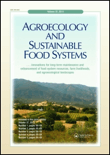
Agroecology and Sustainable Food Systems
Scope & Guideline
Exploring the intersection of ecology and food security.
Introduction
Aims and Scopes
- Agroecological Practices and Innovations:
Research on diverse agroecological practices, including organic farming, permaculture, and agroforestry, that enhance biodiversity, soil health, and ecosystem services. - Food Sovereignty and Security:
Exploration of local food systems, community-supported agriculture, and the role of smallholder farmers in achieving food security and sovereignty. - Social and Economic Dimensions of Agroecology:
Investigations into the socio-economic impacts of agroecological practices, including gender equity, farmers' livelihoods, and community resilience. - Climate Change Adaptation and Mitigation:
Studies focusing on how agroecological approaches can contribute to climate resilience and reduce greenhouse gas emissions in agricultural systems. - Transdisciplinary Approaches:
Research that combines scientific knowledge with local and indigenous knowledge systems to develop sustainable agricultural practices. - Policy and Governance:
Analysis of policies and governance frameworks that support agroecology and sustainable food systems at local, national, and global levels.
Trending and Emerging
- Intersectionality in Agroecology:
An increasing focus on the intersection of gender, race, and socio-economic status in agroecological research, exploring how these factors influence farming practices and food systems. - Urban Agroecology:
Emerging interest in urban agriculture and its role in creating sustainable food systems within cities, addressing issues of food security, community engagement, and environmental sustainability. - Participatory Research and Community Engagement:
A significant trend towards participatory research methodologies that involve farmers and communities in the research process, ensuring that local knowledge and needs are prioritized. - Agroecology and Climate Justice:
Growing emphasis on the role of agroecology in addressing climate change, with research linking environmental sustainability to social justice and equity. - Biodiversity and Ecosystem Services:
Enhanced focus on the benefits of biodiversity in agroecosystems, including the role of pollinators and soil health in sustainable food production. - Policy Advocacy and Frameworks:
Increasing discourse on the need for supportive policies and frameworks that promote agroecological practices and protect food sovereignty.
Declining or Waning
- Industrial Agriculture Comparisons:
There has been a noticeable reduction in comparative studies between agroecological practices and conventional industrial agriculture, suggesting a shift towards more integrated research rather than simple contrasts. - Focus on Technological Innovations:
Research centered on purely technological solutions in agriculture (such as genetically modified organisms or high-tech farming equipment) has decreased, indicating a preference for holistic and ecological approaches. - Single-Crop Focus Studies:
The exploration of single-crop systems and their isolated impacts is waning, as the journal increasingly emphasizes diversified agroecosystems and polycultures. - Market-Driven Approaches:
There is a declining trend in research focused solely on market-driven agricultural practices, with a growing emphasis on community-based and participatory approaches.
Similar Journals
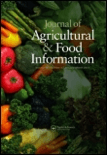
Journal of Agricultural & Food Information
Empowering Research for Sustainable Food Systems.Welcome to the Journal of Agricultural & Food Information, a pivotal platform for disseminating research and insights across the domains of agronomy, food science, and information systems management. Published by Routledge Journals, Taylor & Francis Ltd, this esteemed journal, with an ISSN of 1049-6505 and E-ISSN 1540-4722, plays a crucial role in bridging the gap between innovative agricultural practices and food information systems. Despite its current categorization in the Q4 quartile across relevant fields, it remains committed to fostering scholarly dialogue and encouraging interdisciplinary collaboration. With a history of publication spanning multiple converged years from 1993 to 2024, the journal is dedicated to publishing high-quality, peer-reviewed articles that address the challenges and advancements in agricultural and food information. Currently not available as Open Access, this journal provides valuable insights for researchers, professionals, and students who are eager to harness information for the progress of food security and sustainable agricultural practices. Join the conversation in enhancing our understanding and application of vital agricultural and food-related information.

New Medit
Fostering interdisciplinary dialogue for a sustainable future.New Medit is a distinguished open-access journal published by Bologna University Press, focusing on the diverse realms of agricultural, biological, and social sciences. Established in 1990, New Medit aims to foster interdisciplinary research and dialogue, facilitating knowledge exchange among academics, policymakers, and practitioners. With a notable impact factor and recognized quartile rankings, including Q2 in Agricultural and Biological Sciences and Q3 in various other categories such as Agronomy, Development, and Economics, the journal maintains a steady trajectory of scholarly excellence. Its commitment to accessibility ensures that valuable research is available to a wide audience, thereby contributing significantly to advancements in these critical fields. With its publication history converging from 2008 to 2024, New Medit continues to be a crucial platform for innovative research and comprehensive reviews that address pressing global challenges.
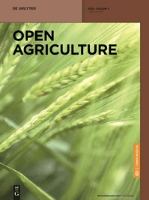
Open Agriculture
Fostering Collaboration in Agricultural ScienceOpen Agriculture, published by DE GRUYTER POLAND SP Z O O, is an innovative open-access journal dedicated to advancing research in the Agricultural and Biological Sciences. Since its inception in 2016, this journal has been committed to disseminating knowledge and facilitating collaboration among researchers, professionals, and enthusiasts in the agricultural sector. With an impressive Q2 ranking in the Agricultural and Biological Sciences category, it holds a prestigious position, ranking #65 out of 221 in its field, placing it in the 70th percentile. Open Agriculture offers a platform for high-quality research across a diverse range of topics, ensuring that crucial findings are readily accessible to the global scientific community. The journal continues to uphold its mission of promoting sustainable agricultural practices and innovations that address contemporary challenges in food security and environmental sustainability. With its strong commitment to open access principles, researchers and students alike can easily engage with cutting-edge research and contribute to the vibrant discourse surrounding modern agriculture.

Frontiers in Sustainable Food Systems
Innovating food systems for a sustainable tomorrow.Frontiers in Sustainable Food Systems, published by FRONTIERS MEDIA SA, stands at the forefront of interdisciplinary research in sustainable food practices, agriculture, and global ecological impacts. This open-access journal, launched in 2018, aims to disseminate innovative findings that reshape our understanding of food systems' sustainability and resilience. With a significant impact factor and ranking in the top quartile across various categories such as Agronomy and Crop Science, Ecology, and Food Science, it is positioned as a leading platform for scholars and practitioners alike. The journal’s commitment to addressing the pressing challenges of food security and environmental sustainability ensures its relevance in today’s rapidly evolving landscape. It is a vital resource for researchers, professionals, and students dedicated to advancing sustainable practices in food systems globally.

International Journal of Agricultural Sustainability
Elevating Agricultural Sustainability Through Open AccessThe International Journal of Agricultural Sustainability, published by Taylor & Francis Ltd, is a leading platform for researchers and professionals in the field of agricultural science, economics, and sustainability. With an impact factor that reflects its strong academic credibility and contribution to the field, the journal has earned esteemed rankings, including Q1 in Agronomy and Crop Science and Q2 in Economics and Econometrics for 2023. Engaging an audience keen on advancing sustainable agricultural practices, the journal has embraced Open Access since 2023, facilitating broader dissemination of vital research findings. With Scopus ranks placing it in the top quartiles and percentiles within its categories, the International Journal of Agricultural Sustainability aims to foster interdisciplinary dialogue and innovative approaches to agricultural sustainability, making it an essential resource for students, researchers, and industry professionals alike.
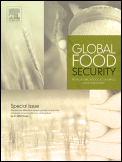
Global Food Security-Agriculture Policy Economics and Environment
Empowering researchers to reshape food security landscapes.Global Food Security - Agriculture Policy Economics and Environment is a leading interdisciplinary journal published by Elsevier that addresses critical issues in food security through the lens of agriculture, economics, and environmental sustainability. With an impressive impact factor and a distinguished placement in the Q1 quartile across multiple categories including Ecology, Food Science, and Safety Research for 2023, this journal is a vital resource for researchers and practitioners aiming to address modern challenges in global food systems. Covering essential topics from agricultural policy to ecological implications, the journal provides a platform for innovative research and policy discussions that foster the advancement of food security on a global scale. Notably, it is indexed in Scopus, where it ranks in the top percentiles across its relevant categories, reflecting its significance in the field. The journal is accessible to a wide audience, making it an indispensable source of knowledge for professionals and students aiming to tackle the complex interplay between food production and environmental stewardship.

African Journal of Agricultural and Resource Economics-AFJARE
Cultivating insights for sustainable resource management.African Journal of Agricultural and Resource Economics (AFJARE) is a dynamic publication dedicated to advancing the fields of agricultural and resource economics within the context of Africa. Published by the African Association of Agricultural Economists, this journal serves as a vital platform for researchers, professionals, and students to disseminate their findings and engage with contemporary issues affecting the agricultural sector across the continent. With an ISSN of 1993-3738 and an E-ISSN of 1993-3738, AFJARE aims to reach a wide audience through its commitment to open access, ensuring that crucial research is accessible to all. The journal has recently established itself in the academic landscape, achieving a Q3 ranking in Agricultural and Biological Sciences and a Q4 ranking in Economics and Econometrics for 2023. Covering a diverse scope from 2018 to 2023, AFJARE encourages submissions that explore innovative economic strategies and policies that can foster agricultural development and resource management in Africa. With its growing impact and relevance, AFJARE is poised to become a cornerstone in the discourse on agricultural economics in Africa and beyond.

Agronomy for Sustainable Development
Fostering Interdisciplinary Collaboration for Sustainable DevelopmentAgronomy for Sustainable Development, published by SPRINGER FRANCE, is a leading international journal dedicated to advancing the field of agronomy and sustainable practices. With its ISSN 1774-0746 and e-ISSN 1773-0155, this esteemed journal plays a pivotal role in disseminating cutting-edge research and innovative solutions that address critical challenges in agriculture and environmental engineering. Achieving remarkable rankings in Scopus—specifically, 19th out of 406 in Agronomy and Crop Science and 22nd out of 197 in Environmental Engineering—underscores its prestige, with a remarkable 95th and 89th percentile respectively. The journal is open access, promoting broader dissemination of knowledge, and welcomes contributions that foster sustainable agricultural practices and enhance environmental stewardship. As an essential resource for researchers, professionals, and students, Agronomy for Sustainable Development serves as a platform for interdisciplinary collaboration aimed at nurturing resilient agricultural systems and promoting sustainability worldwide.
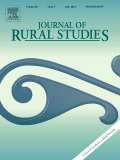
Journal of Rural Studies
Advancing Knowledge in Rural ResearchWelcome to the Journal of Rural Studies, a premier peer-reviewed publication dedicated to advancing the field of rural research. Published by PERGAMON-ELSEVIER SCIENCE LTD, this esteemed journal has been a cornerstone of scholarly discourse since its inception in 1985 and continues to evolve through 2024. With an impressive impact factor and categorization in the Q1 tier across various fields, including Development, Forestry, Geography, Planning and Development, and Sociology and Political Science, the journal is among the elite voices in rural studies. Researchers, professionals, and students alike will find invaluable insights within its pages, supported by rigorous empirical research and theoretical explorations that address the complexities of rural life and its myriad challenges. While it currently does not offer open access, the subscription model ensures a broad dissemination of knowledge, fostering collaboration and innovation within the academic community. With a robust Scopus ranking that places it in the top percentiles across multiple social sciences, the Journal of Rural Studies remains an essential resource for those dedicated to understanding and improving rural environments worldwide.
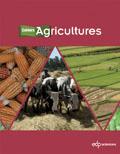
CAHIERS AGRICULTURES
Empowering agricultural innovation and policy.CAHIERS AGRICULTURES is a distinguished open-access journal published by EDP Sciences S A, focusing on the vital fields of Agronomy and Crop Science, Animal Science and Zoology, as well as Management, Monitoring, Policy, and Law. With an ISSN of 1166-7699 and an E-ISSN of 1777-5949, this journal has notably maintained a strong presence in the academic landscape since its establishment, covering a wide range of topics pertinent to agricultural sciences. Based in France, CAHIERS AGRICULTURES fosters collaboration and knowledge sharing among researchers and practitioners through its open-access model, which has been in effect since 2014. The journal is recognized for its rigorous peer-review process, reflected in its competitive Scopus rankings, which place it in the Q2 quartile for both Agronomy and Crop Science, and Animal Science and Zoology. Researchers and scholars are encouraged to contribute cutting-edge findings that may influence agricultural practices and policy development. With a vision to advance sustainable agricultural practices, CAHIERS AGRICULTURES stands as a critical resource for advancing scientific knowledge and informing stakeholders in the agricultural sector.